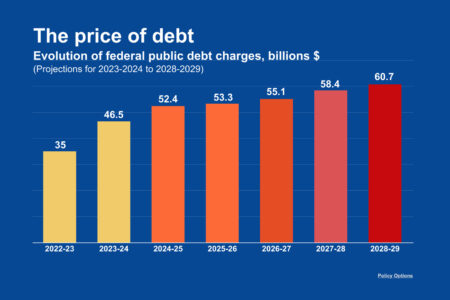
As the Trudeau government moves into the third year of its mandate, support for its performance continues to soften. Trudeau is holding a series of town hall sessions across the country this month, which he has said is about getting out of the “Ottawa bubble” and connecting with Canadians at the community level.
What is clear from our research is that the initial exuberance resulting from the Liberal win is on the wane. In a sense, the Trudeau government’s support is suffering from the transition from the promise of governing to the practice of governing. The longer the Liberals govern, the more likely it is that Canadians will dwell on a policy or a decision they do not like.
The annual Nanos Research-IRPP Mood of Canada survey, now in its 11th year, found that nearly 4 in 10 Canadians described the performance of Justin Trudeau’s government as very poor (24 percent) or somewhat poor (15 percent). Twenty-four percent rated it average, while just over 1 in 3 Canadians described it as very good (11 percent) or somewhat good (26 percent), and 1 percent are unsure (figure 1). This represents a 26-point decrease in “very good” and a 12-point increase in “very poor” since 2015.
On the positive side for the Liberal government, the number of Canadians who think the country is moving in the right direction is holding steady from 2016 — down marginally to 50 percent in 2017 from 54 percent in 2016. It had reached a high of 63 percent shortly after the Liberals won power in October 2015 (figure 2).
Canadians had mixed views on the relationship between the federal and the provincial governments; just over 1 in 3 said it has improved (10 percent) or somewhat improved (25 percent), and just under 1 in 3 said it has somewhat not improved (16 percent) or not improved (16 percent). Just over 1 in 4 Canadians say it is neutral (26 percent) and 8 percent of Canadians were unsure. This represents a 9-point decrease in “improved” since 2016 (figure 3).
A majority of Canadians thought Canada’s reputation around the world over the past year had improved (29 percent) or somewhat improved (25 percent), which is below the 10-year high in 2016 (the figures were 37 percent improved and 26 percent somewhat improved). In 2017, 19 percent rated it neutral, while just over 1 in 4 believe it has not improved (13 percent) or somewhat not improved (13 percent). Three percent were unsure (figure 4).
Nanos Research and the IRPP have been conducting the Mood of Canada survey since 2007. The latest wave is based on a Nanos RDD dual-frame (land and cell lines) hybrid telephone and online random survey of 1,000 Canadians, conducted between December 27 and December 29, 2017. Participants were randomly recruited by telephone using live agents and asked to complete a survey online. The margin of error for a random survey of 1,000 Canadians is ±3.1 percentage points, 19 times out of 20.
Shutterstock/By Albert Pego
Do you have something to say about the article you just read? Be part of the Policy Options discussion, and send in your own submission. Here is a link on how to do it. | Souhaitez-vous réagir à cet article ? Joignez-vous aux débats d’Options politiques et soumettez-nous votre texte en suivant ces directives.









